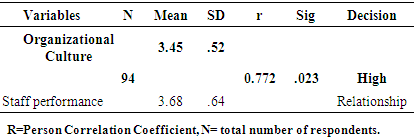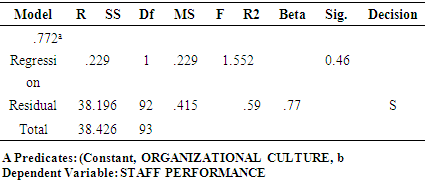-
Paper Information
- Paper Submission
-
Journal Information
- About This Journal
- Editorial Board
- Current Issue
- Archive
- Author Guidelines
- Contact Us
International Journal of Library Science
p-ISSN: 2168-488X e-ISSN: 2168-4901
2020; 9(1): 17-25
doi:10.5923/j.library.20200901.03

Organizational Culture as a Correlate of Staff Performance in State Polytechnic Libraries in North Central, Nigeria
Nathaniel Agbo Oche
Benue State Polytechnic Library, Ugbokolo
Correspondence to: Nathaniel Agbo Oche , Benue State Polytechnic Library, Ugbokolo.
| Email: |  |
Copyright © 2020 The Author(s). Published by Scientific & Academic Publishing.
This work is licensed under the Creative Commons Attribution International License (CC BY).
http://creativecommons.org/licenses/by/4.0/

Libraries in the polytechnic system, are established to provide high quality information services in support of teaching and research for academic staff members as well as acquisition of knowledge of students. The study was carried out for the purpose of determining the relationship between organizational culture and staff performance in state polytechnic libraries in North Central, Nigeria. A correlational survey design was used to find out the relationship between organizational culture and staff performance in the state polytechnic libraries in North Central, Nigeria. The population of the study consisted of one hundred and eight 108 staff in the state polytechnic libraries in the North Central, Nigeria. Since the population is not too large to manage, there was no sampling. Questionnaire and interview were used for data collection. Out of the 108 copies of questionnaire distributed, 94 copies were correctly filled, returned and used for data analysis. This gave a response rate of 87%. The data collected were analyzed using Pearson Product Moment Coefficient for answering research questions 2 while mean and standard deviation were used to answer questions 1, 3 and 4. Regression analysis was used to test the two null hypotheses at 0.05 level of significance. The results indicate that the correlation coefficient(r) of Organizational Culture is 0.772 which confirms a high relationship between Organizational Culture and Staff performance. The study also revealed that some of the problems that militate against staff performance in the state polytechnic libraries in North Central, Nigeria are anchored on the management of the libraries neglecting the provision of working tools and materials to enhance quality services and irregular promotion exercise. Consequently, the study recommended, among others, the provision of working tools and materials to enhance quality services.
Keywords: Organizational Culture, Staff Performance, State Polytechnic Libraries in North Central, Nigeria, Polytechnic Libraries
Cite this paper: Nathaniel Agbo Oche , Organizational Culture as a Correlate of Staff Performance in State Polytechnic Libraries in North Central, Nigeria, International Journal of Library Science, Vol. 9 No. 1, 2020, pp. 17-25. doi: 10.5923/j.library.20200901.03.
Article Outline
1. Introduction
- No organization can function without the full support and contribution of the employees. The quality of library and information services is dependent on certain factors such as the information resources, facilities and most importantly, the personnel in that library. In the polytechnic system, libraries are established to provide high quality information services in support of teaching and research for academic staff members as well as acquisition of knowledge of students.Library staff, according to Ntui, et al (2014) comprise of librarians, paraprofessionals, and non-professionals. Librarians and other library staff provide numerous services to their clientele, addressing their diverse research needs and interests. Academic libraries contribute immensely to knowledge generation and serve a variety of knowledge seekers, especially, in their parent institutions. The extent to which polytechnic libraries can provide services to meet the needs of their clientele is a function of the availability of committed staff and suitable organizational factors. The quality of a polytechnic is measured by the quality of staff in the library because of their unique contributions in the achievement of the overall goals of the polytechnic. For a polytechnic to perform its myriad of functions, quality and efficient staff are a prerequisite Ntui, et al (2014). They stressed further that some staff may perceive their work negatively whereas others may attach positive attributes to them. It is therefore important that employers employ positive organizational factors that motivate their workforce and ensure that the employees continue to bring energy, passion and positive attitude to work every day. Employers must encourage staff to direct efforts towards the successful attainment of the goals and objectives of the organization. People's behaviour is determined by what motivates them and their performance is a product of both ability level and motivation Ntui, et al (2014). Therefore, if the employer is to improve work performance in an organization, attention must be given to those organizational factors that encourage staff performance.Work environment, according to Mayowa-Ademara & Aina (2016) comprises of the totality of forces, actions and other factors that can affect employees' activities and performance. The work environment is the sum of the interrelationship that exists within the environment in which an employee works. Global economic situations have also impacted negatively on State Polytechnics, thereby resulting into shortage of financial support that culminates into budget cuts and elimination of many staff positions. Library staff in Nigeria, like their counterparts in other countries, face the challenges associated with technology, innovation, stress and pressure in the work place. Polytechnics in Nigeria have the mandate of training and providing the middle level manpower for the different sectors of the Nigerian economy. The fundamental objective of polytechnic education is the training of professional skilled workers who are supposed to constitute manpower Abdulsalami & Salami (2015). The services offered by polytechnic libraries are, therefore, tailored towards the needs of their clientele who comprise of students, lecturers, technologists and administrative staff of the institution. Polytechnics offer academic programmes from certificate to Higher National Diploma (HND) in different disciplines. The Polytechnic libraries in Nigeria are crucial to the attainment of these lofty objectives saddled on their parent institutions. They serve as a link to the realization of these objectives through their services.Owing to the fact that library users have varying information needs, there is the need for polytechnic libraries to provide a nexus between their users and the relevant information resources and services in order to be effective. It is important to note that the effectiveness of a library does not depend on the collection or resources and facilities therein but success lies on staff attitude towards the users Ntui, et al (2014).A polytechnic library's culture, according to Needle (2015) could as well be shifting duties and opening hours of services, etc. Effective services can be affected when staff operating on shift report to work late or don't come at all. Similarly, there could be cases of truancy during weekends and holidays. Where there is no alternative power supply to monitor users, there is the likelihood that staff will find it difficult to effectively checkout users when public power supply ceases abruptly. The organization also needs to place emphasis on extrinsic reward system that stimulates and entrenches conformity with laid down rules and regulations to encourage staff productivity. There is also the need for the staff to reciprocate knowledge sharing without discrimination on the basis of sex in the library. Similarly, the culture of the organization should not encourage variation on the style of dress among employees, so as to promote affiliation and encourage performance. A Polytechnic library's organizational culture is described by Onifade (2014) as how the library operates and how its members structure events from both within and outside the library. In order words, the polytechnic library's culture is a force that controls the activities of the library and its members.This study was contextualized within the evolving trends of polytechnic libraries in the North Central geopolitical zone of Nigeria. The libraries of the Polytechnics were established at the same time with their parent institutions, to support the realization of vision and mission of those polytechnics. Benue State Polytechnic, Ugbokolo was established in 1976 and has National Board for Technical Education (NBTE) accredited programmes in various disciplines. NBTE accredited programmes are available in Kogi State Polytechnic, Lokoja, Kwara State Polytechnic, Ilorin, Plateau State Polytechnic, Barkin Ladi, Nasarawa State Polytechnic, Lafia and Niger State Polytechnic, Zungeru which were established in 1993, 1973, 1978, 2001 and 1991 respectively.It is in view of this state of the art, therefore, that there was need to investigate organizational factors as correlates of staff performance in State polytechnic libraries in North Central geopolitical zone of Nigeria. The dependent variables are the library staff performance while the organizational factors are the independent variables.
2. Statement of the Problem
- Employers must encourage their staff to direct efforts towards the successful attainment of goals and objectives of the organization. From observation in some academic libraries in Nigeria, there exists poor job performance among the staff. The Library staff is expected to assist researchers and students in effective and efficient use of the library. However, in most cases, it was observed that the Library staff were not willing to attend to users and they exhibited lukewarm attitude in the performance of their statutory duties.At times, the staff are not even found on their duty posts and even when found, are either sleeping or engrossed in discussion among themselves. A close attention to most of their discussions centre more on their salary payment, reward system, office working environment, fringe benefits, staff training and channels of communication. They saw those things as affecting their job performance. It is imperative to find out if factors that affect the library staff as an individual can impact on his or her performance as a service provider as well.A few studies have considered the effect of organizational culture on staff performance towards the attainment of the polytechnics goals and objectives, and none on the state polytechnic libraries in North Central, Nigeria. In the light of this, the problem of this study put in question form is, what is the relationship between organizational culture and staff performance in state polytechnic libraries in North Central, Nigeria?
3. Purpose of the Study
- The general purpose of this study was to investigate organizational culture as a correlate of staff performance in State Polytechnic libraries in North Central, Nigeria. Specifically, the study was conducted to:I. Determine the levels of performance of staff in polytechnic libraries in North Central, Nigeria;II. Examine how organizational culture relates to staff performance in state polytechnic libraries in North Central, Nigeria.III. Find out the problems that militate against staff performance in the state polytechnic libraries under study;IV. Identify the strategies that can be used to improve staff performance in the state polytechnic libraries under study.
4. Research Questions
- The following research questions were formulated to guide the study.I. What are the levels of performance of staff in Polytechnic Libraries in North Central, Nigeria?II. What is the relationship between organizational culture and staff performance in State Polytechnic libraries in North Central, Nigeria?III. What problems militate against organizational culture in improving staff performance in state polytechnic libraries in North Central, Nigeria?IV. What are the strategies for enhancing staff performance through organizational culture in State Polytechnic Libraries in North Central, Nigeria?
5. Statement of Hypotheses
- The following null Hypotheses were formulated to guide the study and were tested at 0.05 level of significanceHO1: There is no significant relationship between organizational culture and staff performance in state polytechnic libraries in North Central, Nigeria.HO2: There is no significant influence of organizational culture on the staff performance in State polytechnic libraries in North Central, Nigeria.
6. Review of Literature
6.1. Organizational Culture
- The polytechnic library with its staff, users and collections cutting across different cultural background remain a focus for critical study. According to Kaarst-Brown et al (2004) theorists have suggested that organizational culture is a strategic resource that has value in ensuring the continued existence and success of organizations. They opined that there are characteristics of organizational culture in information- based organizations that lead to increased collaboration, collegiality and organizational effectiveness.According to Luu (2010), organizational culture functions as the internal integration and coordination between an organization's operations and its employees. Where if it fails to fulfil these functions to a satisfactory level, employees may be influenced negatively but if there is a positive influence, it supports adaptation and enhances employees' performance by motivating, shaping and channeling their behaviour towards the attainment of corporate objectives.Shein (2011) defined organizational culture as the set of shared values, beliefs and norms that influence the way employees think, feel, and behave in the workplace. Understanding the values, norms and expectations of polytechnic libraries commit staff to exert extra effort towards attaining institutional objectives. Introduction of social programmes like, condolence visits to bereaved colleague(s), end-of-the-year party, birthdays, promotions and other achievements which bring staff together outside the normal office hours also impact positively on staff productivity.Igbal (2013) asserted that a strong culture within the organization leads to raising the employees' commitment towards achieving the goals of the organization on a common path. They also stated that personal beliefs are different from organizational values but in a strong culture, employees are in common path towards achieving organizational goals, which provide the opportunity to the employees to grow and perform well in the organization.
6.2. Staff Performance
- An organization's failure or success depends to a large extent on the job performance of the individuals in the organization. The relevance of training and its considerable impact on job performance was discussed by Cheng & Ho (2009) stated that whereas staff performance is seen as one of the crucial measures given top priority by top management, staff are more concerned about issues bothering on their own output and are increasingly aware of the increasing obsolescence of knowledge and skills in the turbulent environment. As suggested by the literature, continuous training and development of staff can effectively make the staff to be more aligned for career growth since career potential promotes personal motivation.People's behaviour, according to Ntui, et al (2014) is determined by what motivates them and their performance is a product of both ability and motivation. Therefore, if the employer is to improve the work of the organization, attention must be given to the level of motivation of its members. It is necessary to observe the library staff more closely to determine what affect their performance at work.According to Dean (2011), job satisfaction is important not just because it boosts work performance but also increases our quality of life. Happiness in the work place leads to much higher levels of productivity.Job performance, according to Johari & Yahaya (2011) has become one of the significant indicators in managing organizational performance. According Awulosi (2012), Indicators of job performance are as follow:I. Quality of work: Quality of work is based on established standards usually measured by accuracy, thoroughness, skills and success at work.II. Quantity of work: This is the amount of work done according to the time available. It is not the result of routine work but how fast work can be completed.III. Punctuality: Punctuality is related to the appropriateness of time to finish the job within a pre-set time. Standard setting time is usually based on previous experience.Evidently, in polytechnic libraries in Nigeria there are life threatening harmful and challenging situations which affect library staff performance and wellbeing. Some of these include economic instability, unconducive working environment, incessant power outage, vandalism of information materials, defective information services, insufficient funding and fund shortage Amusa et al (2013) and Isebe (2015). Oyewole & Popoola (2013) opined that there is a level of job performance that is expected by every organization from its employees.There is the need for Library management to identify areas of strength and weakness of each staff so as to avoid putting the square peg in the round hole. Marjari & Scheilicipoura (2012) stressed that the employees' inner satisfaction, happiness and encouragement affect the effectiveness and efficiency of organizations regarding the extent of productivity. They stressed further that the organizational effectiveness play a crucial role in the organizational development. The literature review revealed that no study has so far been conducted on the topic. “Organizational culture as a correlate of staff performance in State Polytechnic Libraries in North-Central Zone of Nigeria”. This study specifically aimed at filling this palpable gap in knowledge.
7. Research Methodology
- This study adopted a correlational survey design. According to Cherry (2018), a correlational research design involves looking at relationships between two or more variables. The author stressed further that while researchers can use correlations to see if a relationship exists, the variables themselves are not under the control of the researchers. The libraries under study, have the relevant workplace, work activities and personnel, and provided adequate grounds for the researcher to carryout studies on organizational culture and staff performance.
8. Population of the Study
- The population of the study is 108 consisting of professionals (Librarians, 27), Para-professionals (Library Officers, 64) and non-professionals (Computer Operators and Administrative Staff, 17) in the State Polytechnic Libraries in the North Central geographical zone of Nigeria.The entire population of 108 comprising of Professionals (Librarians), Para-Professionals (Library Officers)and Non-Professionals in the libraries of the state polytechnics in the North Central Geo-political zone of Nigeria constituted the sample as it was considered not too large to manage. Therefore, no sampling was carried out.The questionnaire consists of 4 clusters in line with the research questions. In all the clusters, a 4 rating scale was used with nominal values of 4-1 in a descending order of magnitude as follows. Strongly Agree (SA) = 4 point, Agree (A) = 3 point, Disagree (D) = 2 point and Strongly Disagree (SD) = 1 point.The entire population of 108 comprising of Professionals (Librarians), Para-Professionals (Library Officers) and Non-Professionals in the libraries of the state polytechnics in the North Central Geo-political zone of Nigeria constituted the sample as it was considered not too large to manage. Therefore, no sampling was carried out.
9. Instrument for Data Collection
- The researcher developed the questionnaire and interview schedule that were used for the data collection. The questionnaire was titled “Organizational Culture and Staff Performance Questionnaire” (OCSPQ).In addition to the questionnaire, structured interview was administered on the library staff based on the research questions to stimulate them into detailed discussion of organizational factors affecting staff performance. The researcher collected the data with the assistance of four research assistants, who were adequately briefed on how to personally administer copies of the questionnaire to all the respondents. The task of personally administering the questionnaire to the respondents was to ensure impressive return rate. The questionnaire were administered in the offices of the respondents between the hours of 10 am and 12 noon each working day which was considered as the peak period of office hours. Completed questionnaire were collected within four weeks after administration. Out of the 108 copies of the questionnaire distributed, 94 representing 87% response rate, were filled, retrieved and used for data analysis.With the aid of the structured interview, the researcher posed questions intended to lead the interviewees towards giving data to meet the objectives of the study and probed the interviewees in order to seek clarification on responses provided. The interview guide was administered on the management of the libraries under study.
10. Method of Data Analysis
- Pearson Product Moment Coefficient(r) was used to answer research questions 2 while mean and standard deviation were used to answer research questions 1, 3 and 4. The correlation coefficient index was interpreted, according to Uzoagulu (2011), using the criteria/guidelines below.0.00 0.19 very low relationship0.20 0.39 low relationship0.40 0.69 moderate relationship0.70 0.89 high relationship0.90 1.00 very high relationshipThe null hypotheses were tested the Linear Regression Analysis at 0.05 level of significance. The benchmark for the mean and standard deviation are shown below,3.50---4.00---Strongly Agree2.50---3.49---Agree1.50---2.49---Disagree1.00---1.49---Strongly Disagree
11. Results and Discussion
- The results are presented according to the research questions and hypotheses that were formulated for the study. Summary of findings of the study is also presented.Research question 1: What are the levels of staff performance in State Polytechnic Libraries in North Central, Nigeria? To answer this question, response were collected and analysed as shown in Table 1.
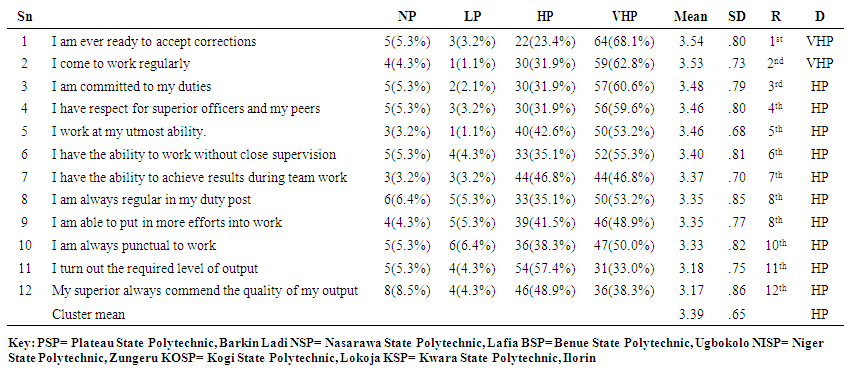 | Table 1. Mean and Percentages of Levels of Staff Performance in State Polytechnic Libraries |
|
|
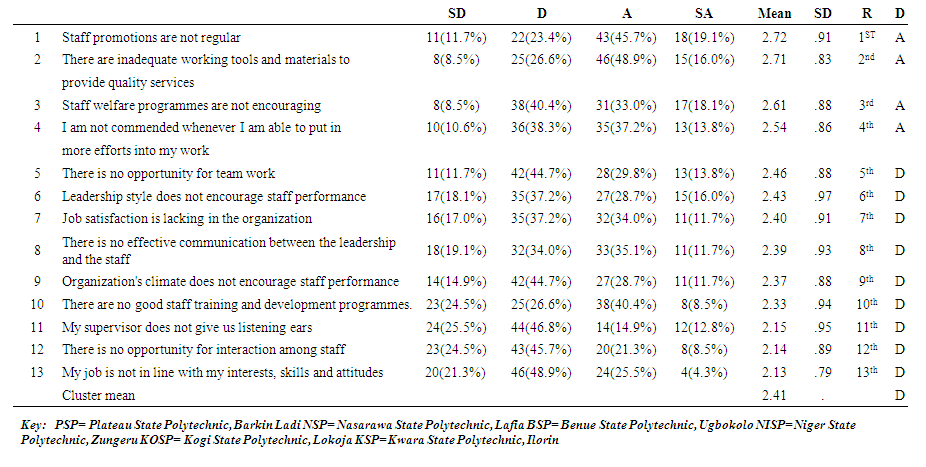 | Table 4. Mean and Percentage Distribution of problems militate against organizational culture in improving staff performance in state polytechnic libraries |
|
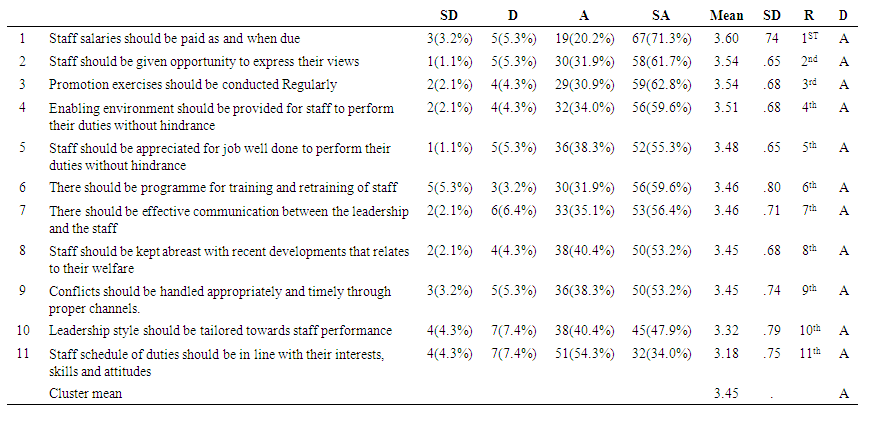 | Table 6. Mean Ratings of Strategies for enhancing staff performance through organizational culture in State Polytechnic Libraries |
12. Summary of Findings
- 1. There is high relationship between organizational culture and staff performance in the state polytechnic libraries in North Central, Nigeria. The Beta (â) weighting of .77 confirms that for every standard deviation unit change in organizational culture, staff performance will rise by .77 (77%).2. The overall mean showed that I am ever ready to accept correction (mean = 3.54) is ranked highest, while my superior always commend the quality of my output (= 3.17) is ranked lowest as regard to the level of staff performance in state polytechnic libraries in North Central Nigeria.3. As for the problems that militate against organizational factors in improving staff performance, the overall mean showed that staff promotion is not regular (mean = 2.72) which is ranked highest while job is not in line with my interest, skills and attitude (mean =2.13) is ranked lowest.4. The overall mean for strategies for enhancing staff performance through organizational factors indicate that staff salaries should be paid as and when due (mean = 3.60) while, that staff schedules of duties should be in line with their interests, skills and attitudes with the mean of 3.18 is ranked lowest.
13. Conclusions
- Based on the findings of the research, the researcher therefore concludes, that there is a high relationship between organizational culture and staff performance in State Polytechnic Libraries in North Central, Nigeria. The greatest problem that militate against organizational factors in improving staff performance is staff promotion with an overall mean of 2.72. However, the highest strategy for enhancing staff performance through organizational factors in the State Polytechnic Libraries in North Central, Nigeria is payment of salaries as and when due.
14. Recommendations
- Based on the findings of this study, the following recommendations were made:1. Employees' welfare should be taken as an overriding factor by the administration. This should also include formulation of policies and culture that are all-encompassing to include training, retraining, promotion and payment of salaries and rewarding of staff to reduce turnover intentions.2. The condition of service of polytechnic employees should be reviewed on a regular basis to promote high level of staff morale.3. Library administration should create a platform whereby information concerning job description, specification, and requirements are well spelt out to stimulate enthusiasm for the workers to give their best to the organization.Library administration should make sure that the information transfer structure within the library is well-organized to provide feed backs for the employees on the quality of the performance they put into 1. their jobs.
ACKNOWLEDGEMENTS
- The author is grateful to the Almighty God for making this publication possible. The contributions of Mr. Michael Igbudu and the SAP team in guiding the author throughout the process are highly appreciated.
 Abstract
Abstract Reference
Reference Full-Text PDF
Full-Text PDF Full-text HTML
Full-text HTML